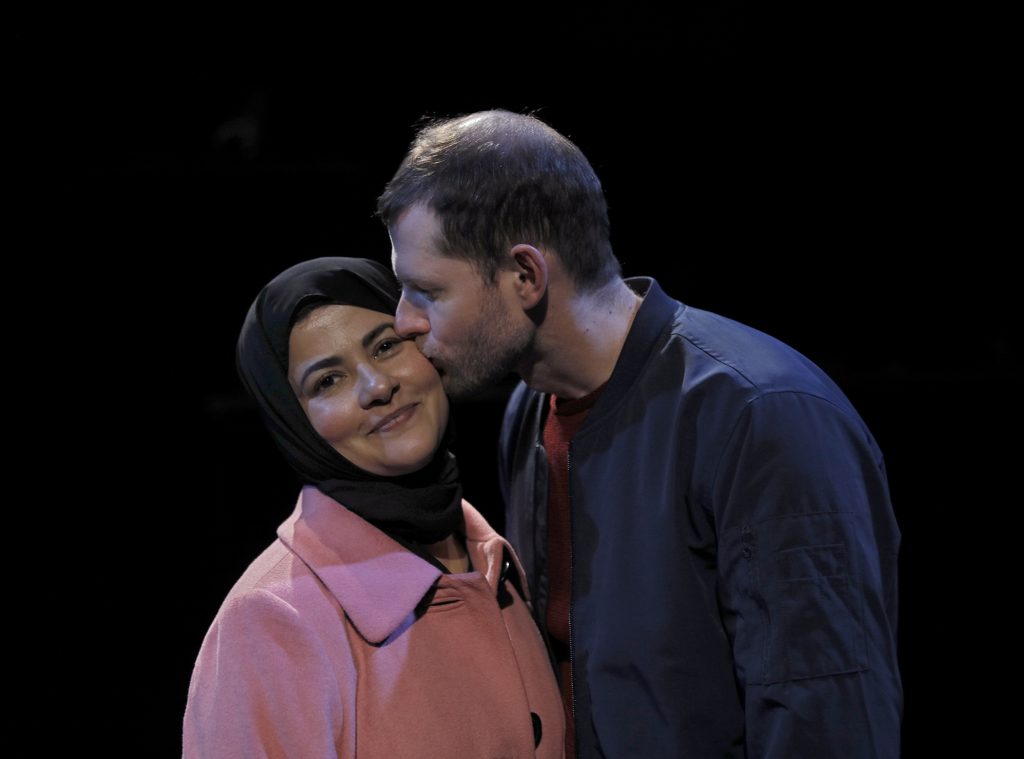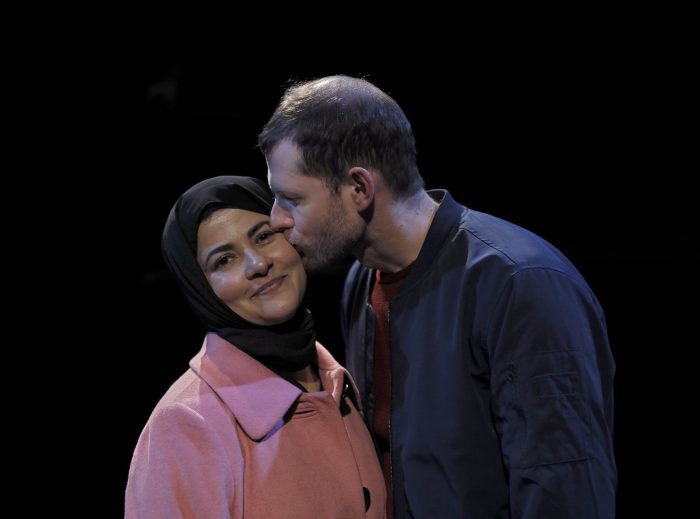
Photo by Chris Bennion
Otherwise known as “creating plays with characters and situations that don’t ring true…
Case in point: ACT’s world premiere of Yussef El Guindi’s latest work, the drama PEOPLE OF THE BOOK which opened on September 12th. It’s the latest collaboration between ACT and the Egyptian born playwright who have also teamed up to produce successful other works including Pilgrims Musa and Sheri in the New World and Threesome. Like those works, People of the Book also centers on relationships between Arab, Arab-American and non-Arab characters and cultures. Those interactions, sometimes violent and sometimes passionate are cornerstones of the playwright’s work.
Here we center on two couples with each couple consisting of an Arab or Arab-American person paired with a non-Arab. The play opens with one couple, the allegedly happily married poet Amir and his artist/wife Lynn who have been together since high school, preparing to meet up with another friend from high school, the suddenly very successful writer Jason who has received international attention for his best selling memoir detailing his life as an American soldier in the Middle East and more specifically, details the shocking wartime encounter where he met Madeeha, who become the love of his life.
Supposedly.
There’s tension from the get because Jason and Amir were both rivals as writers and for the attention of Lynn. Amir didn’t think much of Jason’s writing and “won” Lynn’s hand with the result that Jason has not only a bit of a grudge against Amir, he’s also a bit cocky that he now is a far more successful writer than Amir could ever hope to be, as a poet. To ramp up the tension even further, of course Lynn also still has a bit of a thing for Jason and very much admires his muscled physique.
Yes. It’s a bit soapy. And, it doesn’t really get much better as the play progresses. Jason ends up spending the night at Lynn and Amir’s home and has some PTSD nightmares during the night which results in an odd dream sequence presented onstage with Jason in a not terribly original “game show for your life” scenario featuring a Dream Amir as the menacing host. The dream sequence concludes with Jason fleeing from the house in the middle of the night and…Lynn racing after him to make sure he is “ok”.
Cut to some time (but not much later) and another oddly staged/written scene where Jason welcomes his Middle Eastern Arab “war bride” Madeeha to the United States upon her arrival at the airport, that comes complete with hordes of paparazzi on hand to storm the couple with attention…something that frequently happens to new authors of best sellers in 21st century America.
Uh, huh.
Following that scene, we get the settling in of Madeeha in her new American home and the first inkling that something ain’t right with this situation. Jason seems ill at ease with his supposed “love of his life”…in fact, he seems to fear and despise her. Meanwhile, the character of Madeeha provides the first sign of life in the entire play. Her character is odd, enigmatic and mysteriously interesting…not particularly realistic, but at least the character has some layers to her. Part of that is the excellent performance by actress Monika Jolly, but it’s also the character itself. Madeeha doesn’t end up seeming very real, but at the very least she’s written with having a sense of purpose. Her mission is to give this story the only bit of sizzle in the entire 100+ minutes of its telling.
Naturally, Amir and Lynn come for a dinner party visit and…there are more revelations that something isn’t normal about any of this…Jason and Madeeha’s relationship or their supposed past history as outlined in Jason’s book or even the book itself. Are the facts presented in the book truthful or not, and ultimately who is the real author of “the book”? Amir has his suspicions which leads to strife with Lynn who is all dewy eyed with an odd sudden patriotic love of Jason, the U.S. military and the idea of brave soldiers going off to war to defend freedom, especially if they have big biceps and a nice chest.
Ultimately, a lot of betrayals are either revealed or hinted at with the result that much of the proceedings do seem a bit like a very modern kind of soap opera, not aided by the fact that both of the non Arab characters, Jason and Lynn, are written as idiots and Madeeha is presented as a confusing enigma. Is she a righteous defender of Muslim womanhood who may have freed herself from the tyranny of a toxic relationship or is she just a batshit crazy dame that took matters into her own hands to attain what she wanted? Or, a bit of column A and a bit of Column B?
Oddly or not, the most rational character is the Arab-American Amir who seems to have the most level head of the four…but, that’s not saying much since the other three all have a tissue of issues. As does the play itself, which is all over the place in terms of styles and confused situations. Like, WHEN/WHERE are we in this play? Is it “now” meaning 2019-ish or a few years ago? The characters all seem to be acting within a timeline that the “war” is recent-ish but it’s rather vague and all four characters seem to be well into their 30s yet it seems like Jason is a rather young/naive kind of soldier when the “incident” happened. And, when did Jason write his book? And, why was Madeeha forced to wait so long before coming to America? The sloppy plotting of the play doesn’t really bother to make any effort to create a reliable reason for anything that happens within the context of the play. It’s just story beats strung along in a random sort of way.
So, the play itself is messy and the direction by John Langs doesn’t do much to clarify any of it. The actors are all “fine” with the already lauded Monika Jolly benefiting from the intriguing nature of her character and what she brought to that portrayal. Wasim No’mani also nicely grounded his take on Amir, the only relatively organically natural character present.
It was all a bit underwhelming for me. I think both the playwright and ACT can and have done better work together. Other than Ms Jolly’s performance, not much else to recommend here.














